Active and Passive Constructions
There are two ways of expressing an action by using a transitive verb. Read the following sentences:
1. You invited me.
2. I was invited by you.
These two sentences have the same meaning. They are simply two different ways of saying the same thing.
In sentence 1, the subject ‘You’ is the doer of the action, therefore, the verb ‘invited’ is said to be in the Active Voice.
In sentence 2, the subject ‘I’ is the receiver of the action. The verb ‘was invited’ is, therefore, said to be in the Passive Voice.
So we may say that a transitive verb may be used in (a) Active Voice (b) Passive Voice.
Related Links
A verb is said to be in the Active Voice when the subject acts or performs the action. For example:
1. They speak French.
2. Rahul can solve the problem.
3. He will buy a car.
4. She told a story
5. I am revealing the secret.
6. You have done it very well.
7. We had informed the police.
In the above sentences, the subjects (They, Rahul, He, She, I, You and We) have been placed before the transitive verbs (speak, solve, buy, told, revealing, done and informed) to show that the action is performed by the subjects. Hence all these sentences are in Active Voice.
A verb is said to be in the Passive Voice when the subject of the verb is acted upon or receives the action. For example:
1. French is spoken by them.
2. The problem can be solved Rahul.
3. A car will be bought by him.
4. A story was told by her.
5. The secret is being revealed by me.
6. It has been done very well by you.
7. The police had been informed by us.
In the above sentences, the subjects (French, The problem, A car, A story, The secret, It and The police) receive the action done by the objects (them, Rahul, him, her, me and you. So the verbs (is spoken, can be solved, will be bought, was told, is being revealed, has been done and had been informed) are in Passive Voice.
Please Note: It is the form of the verb in a sentence which shows whether the subject is the doer or the receiver of action.
Transformation from Active Voice to Passive Voice
Only transitive verbs can be changed into passive voice. Intransitive verbs have no objects, so they have no passive voice. For example:
1. John died in the morning.
2. I am living here for the past ten years.
3. He sits in the chair.
4. Neera sleeps every day in the afternoon.
5. They reached in time at the station.
6. You came here an hour ago
7. The team has gone to Chennai.
8. It smells very nice.
9. She stands in the first row.
10. I feel sorry for this mistake.
(1) When a verb is changed from the Active into the Passive Voice, the Object of the Active Verb becomes the Subject and the subject becomes the object. For example:
Objects are changed as under:
| Object | is changed into | Subject |
| Name of person, place or thing | is changed into | No change |
| me | is changed into | I |
| us | is changed into | We |
| you | is changed into | You |
| him | is changed into | He |
| her | is changed into | She |
| them | is changed into | They |
| It | is changed into | No change |
Subjects are changed as under:
| Subject | is changed into | Object |
| Name of person, place or thing | is changed into | No change |
| I | is changed into | me |
| We | is changed into | us |
| You | is changed into | you |
| He | is changed into | him |
| She | is changed into | her |
| They | is changed into | them |
| It | is changed into | No change |
(2) Change the verb into Past Participle (III form). Put proper form of the verb ‘to be’ before it according to the tense of the main verb in Active Voice and the number (singular/plural) of the new subject. For example: is done, are being done, was done, has been done, will be done, shall have been done etc.
The following table gives the form of the verb ‘like’ in Passive Voice in the various tenses.
| Tense | Indefinite | Continuous | Perfect | Perfect Continuous |
Present | is/are/am+III Form of the verb is liked are liked am liked | is/are/am+being+III Form of the verb is being liked are being liked am being liked | has/have+been+III Form of the verb has been liked have been liked | No Passive |
Past | was/were+III Form of the verb was liked were liked | was/were+being+III Form of the verb was being liked were being liked | had+been+III Form of the verb had been liked | No Passive |
Future | will/shall+be+III Form of the verb will be liked shall be liked | No Passive | will/shall+have+been+III Form of the verb will have been liked shall have been liked | No Passive |
(3) Tense of the verb is not changed. Only its form is changed. For example:
She teaches you English. (Active)
You are taught English by her. (Passive)
(4) ‘By’ is used with the doer of action when it helps to complete the sense.
For example: A race is run by them. This letter has been written by me. etc.
(5) Such indefinite and vague subjects as ‘someone’, ‘somebody’, ‘everybody’, ‘they’, ‘people’ etc. are dropped. For example:
| Active Voice | Passive Voice |
1. Someone has broken this table. 2. People always admire his attitude. | 1. This table has been broken. 2. His attitude is always admired. |
(6) Sometimes a verb in the active voice takes two objects — a direct one (thing) and an indirect one (person). Either of them may be used as the subject in the passive voice. For example:
My uncle gave me a gift. (Active)
A gift was given to me by my uncle. (Passive)
I was given a gift by my uncle. (Passive)
My father teaches me German. (Active)
I am taught German by my father. (Passive)
German is taught to me by my father. (Passive)
(7) Prepositions must not be left out with verbs requiring them. For example:
The nurse looks after the baby. (Active)
The baby is looked after by the nurse. (Passive)
He listened to the teacher. (Active)
The teacher was listened to by him. (Passive)
I was knocking at the door. (Active)
The door was being knocked at by me. (Passive)
(8) ‘Who’ is changed into ‘by whom’ but other (Wh) words like which, where, when, how etc remain same as they are used while making passive voice. For example:
Who does not like this book? (Active)
By whom is this book not liked? (Passive)
Which book do you want? (Active)
Which book is wanted by you? (Passive)
When are you buying a new car? (Active)
When is a new car being bought by you? (Passive)
(9) Present Perfect Continuous, Past Perfect Continuous, Future Continuous and Future Perfect Continuous have no passive voice.
Observe the following passive structures:
| No. | Active Voice | Passive Voice |
| 1. | They do not grow rice. | Rice is not grown by them. |
| 2. | They kept us waiting. | We were kept waiting by them. |
| 3. | I shall not speak a word to you. | Not a word will be spoken to you by me. |
| 4. | He is running a race. | A race is being run by you. |
| 5. | Reena was ironing her clothes. | Her clothes were being ironed by Reena. |
| 6. | You have won a prize. | A prize has been won by you. |
| 7. | I have never seen this book before. | This book had never been seen by me before. |
| 8. | We shall have saved enough by that time. | Enough money will have been saved by us by that time. |
| 9. | Do they speak French? | Is French spoken by them? |
| 10. | Did they win the match? | Was the match won by them? |
| 11. | Will you help me? | Shall I be helped by you? |
| 12. | Are you writing a letter? | Is a letter being written by you? |
| 13. | Was he reading a book? | Was a book being read by him? |
| 14. | Has he invited you? | Have you been invited by him? |
| 15. | Had they seen us before? | Had we been seen by them before? |
| 16. | May I take this book? | May this book be taken by me? |
| 17. | Who wrote this novel? | By whom was this novel written? |
| 18. | Why did you call him? | Why was he called by you? |
| 19. | Whom do you want? | Who is wanted by you? |
| 20. | What did you buy? | What was bought by you? |
| 21. | How could you help me? | How could I be helped by you? |
| 22. | Who teaches you Chemistry? | By whom are you taught Chemistry? |
| 23. | Do it. | Let it be done. |
| 24. | Do not inform the teacher. | Let the teacher not be informed. |
| 25. | Let him run a race. | Let a race be run by him. |
| 26. | Please help me. | You are requested to help me. |
| 27. | Work hard. | You are advised to work hard. |
| 28. | Keep to the left. | You are directed to keep to the left. |
| 29. | Stand up on the table. | You are ordered to stand up on the table. |
| 30. | I can lift this box. | This box can be lifted by me. |
| 31. | One ought to do one’s duty. | Duty ought to be done. |
| 32. | We ought to respect our elders. | Our elders ought to be respected by us. |
| 33. | He might suffer a great loss. | A great loss might be suffered by him. |
| 34. | You will have to do it. | It will have to be done by you. |
| 35. | Women like to talk. | It is liked by women to talk. |
| 36. | It is time to call the roll. | It is time for the roll to be called. |
| 37. | They spoke to him. | He was spoken to by them. |
| 38. | He agreed to my proposal. | My proposal was agreed to by him. |
| 39. | She acted upon my advice. | My advice was acted upon by her. |
| 40. | Why are you laughing at me? | Why am I being laughed at by you? |
| 41. | She knows me. | I am known to her. |
| 42. | This jar contains water. | Water is contained in this jar. |
| 43. | His behaviour surprised me. | I was surprised at his behaviour. |
| 44. | His remarks offended me. | I was offended with his remarks. |
| 45. | No one has ever beaten me at tennis. | I have never been beaten at tennis. |
| 46. | Sit down. | Be seated. |
| 47. | One cannot help it. | It cannot be helped. |
| 48. | They say that you are a liar. | You are said to be a liar. |
| 49. | May I go out? | Am I allowed to go out? |
| 50. | Thank God. | God be thanked. |
| 51. | May you live long! | It is prayed that you may live long. |
| 52. | Seven days make a week. | A week is made with seven days. |
| 53. | I did not praise anybody. | Nobody was praised by me. |
| 54. | Fire burnt the shed to ashes. | The shed was burnt to ashes. |
| 55. | He made his servant do all the work. | His servant was made to do all the work. |
| 56. | My hair needs cutting. | My hair need to be cut. |
| 57. | Quinine tastes bitter. | Quinine is bitter when (it is) tasted. |
| 58. | One should keep one’s promise. | Promises should be kept. |
| 59. | The people lined the road. | The road was lined with people. |
| 60. | No one can wonder at it. | It cannot be wondered at by anyone. |
Related Links
Save
Save
Save
Save
There are two ways of expressing an action by using a transitive verb. Read the following sentences:
(i) Hari killed a snake.
(ii) A snake was killed by Hari.
These two sentences have the same meaning. These are simply two different ways of saying the same thing. There is, however, a shift in stress on the agent and also a change in the form of a verb.
In sentence (i), the subject ‘Hari’ is the ‘doer’ of the action. It acts or is active. So the verb ‘killed’ is in the active voice.
In sentence (ii), the subject ‘A snake’ is the ‘receiver‘ of action. It suffers the action done by someone else (Hari, in this case). It is acted upon. So the verb ‘was killed’ is in the passive voice.
Study the following examples: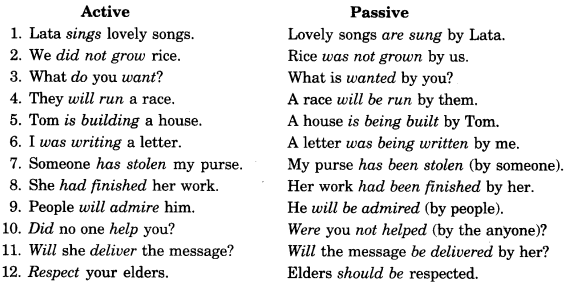
WHAT DO YOU NOTICE?
- Only Transitive Verbs can be changed into Passive Voice.
- A transitive verb has an object, which becomes the subject of the Passive Voice.
- The subject of the Active Voice is made the object of some Preposition generally ‘by’
- The passive contains the Past participle (Third form) of the Main Verb.
- Some form of the Verb ‘to be’ (is, am, are, was, were, being or been) is used according to Tense.
- The Tense of the Verb does not change.
Table I: Table of Verb Forms
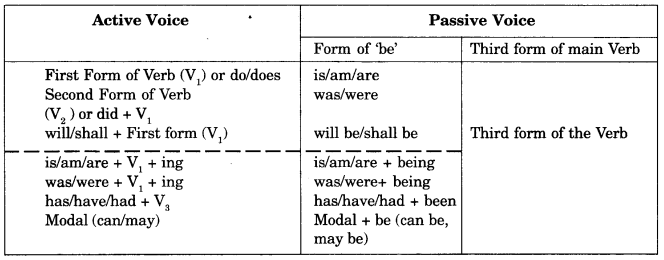
Table II: Tense Chart (Passive Voice)
forms of the Verb ‘love’ in various tenses
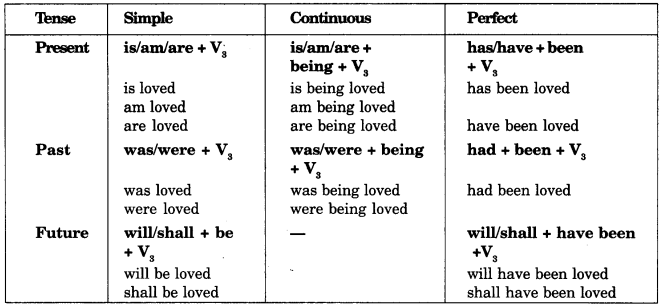
The case of pronoun also changes from Nominative to Accusative. Study the following table:
PRONOUN

It follows that the ‘Object’ in the active voice also suffers a change. When the pronoun becomes subject in the Passive Voice, it assumes the nominative case.
Study the following:
CHANGE OF VOICE IN TENSES
The change of Voice takes place only in the following EIGHT tenses:
1. Simple Present Tense
2. Simple Past Tense
3. Simple Future Tense
4. Present Continuous Tense
5. Past Continuous Tense
6. Present Perfect Tense
7. Past Perfect Tense
8. Future Perfect Tense
The tenses have been grouped in this order to help the students grasp the changes with minimum effort. The form of the verb in Active, as well as Passive Voice, has been provided to facilitate comparison, identification, and execution of the change.
Note. The following four tenses have no passive forms.
1. Future Continuous
2. Present Perfect Continuous
3. Past Perfect Continuous
4. Future Perfect Continuous
Let us study the Active and Passive Voice Constructions tense wise:
1. THE SIMPLE PRESENT TENSE
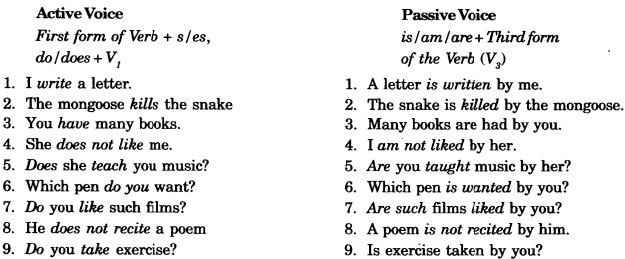

2. THE SIMPLE PAST TENS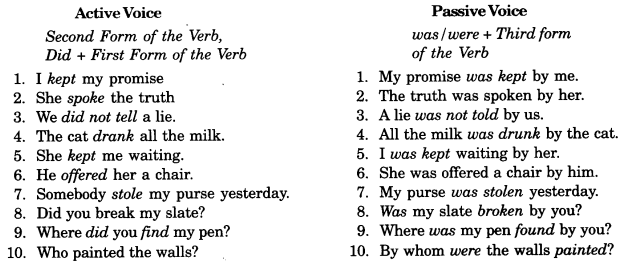
3. THE SIMPLE FUTURE TENSE

4. PRESENT CONTINUOUS TENSE
5. PAST CONTINUOUS TENSE
6. PRESENT PERFECT TENSE
7. PAST PERFECT TENSE

8. FUTURE PERFECT TENSE


IMPORTANT NOTE. The following tenses have no Passive Voice:
- Future Continuous
- Present Perfect Continuous
- Past Perfect Continuous
- Future Perfect Continuous
Now, let us study some other typical constructions:
1. MODALS FOLLOWED BY VERBS
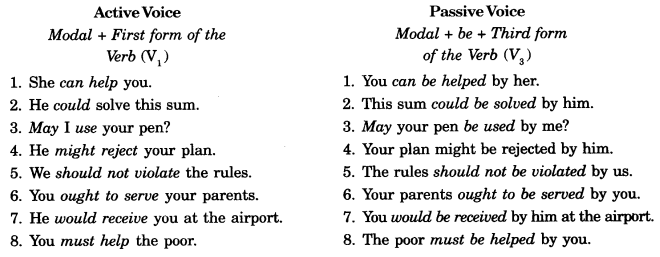
2. IMPERATIVE SENTENCES
Imperative sentences begin with the first form of the verb. In case of request, ‘please’ or ‘kindly’ may be added before the infinitive.
Imperative Sentences may be divided into three types:
(i) Where the action is confined to the subject.
(ii) Where the subject receives the action.
(iii) Offers/suggestions beginning with ‘let’
Let us study them separately:
Type I. Request/Advice/order confined to the subject. Use: ‘You are ordered/advised/requested + to’ according to sense followed by the first form of the verb.
Illustrative Examples:
Type II. Where the object receives voice. Then add the’ and the third form of the verb.
Illustrative Examples: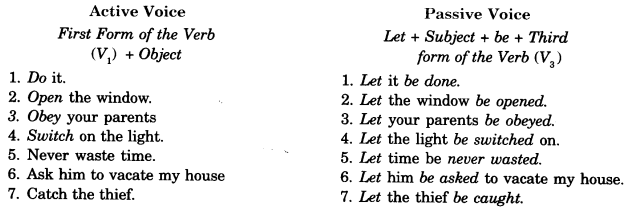
Note.
- We use the pronoun in objective forms after ‘let’
- We can use ‘should + be + V3’ in place of ‘Let + be + V3’
The above sentences could be changed into passive voice with the help of ‘should’ as under:
- It should be done.
- The window should be opened.
- (Your) parents should be obeyed.
- The light should be switched on.
- Time should never be wasted.
- He should be asked to vacate my house.
- The thief should be caught.
The form with ‘Let’ is more popular nowadays.
Type III. Offers/Suggestions with ‘Let’. The Active Voice has the First Form of the Verb after let and Noun/Pronoun. While changing the voice, retain ‘let’ but transfer the object of active voice after Tet’ and then add be + Third form of the Verb and the agent (doer/subject in the active voice)
3. SENTENCES WITH INFINITIVES
Type I. to + infinitive. While changing sentences with ‘to + First Form of the Verb’ into the Passive voice, the infinitive becomes a passive infinitive i.e. to + be + third form of the verb.
The main verb (if any) remains unchanged.
Illustrative Examples:
Type II. Bare infinitive. The Bare Infinitive is changed to full infinitive i.e. to + infinitive. The main verb is changed into Passive form according to the tense.
Illustrative Examples:
4. SENTENCES BEGINNING WITH ‘IT IS TIME
The sentences beginning with ‘It is time’ have a ‘to-infinitive’ followed by ‘Object’ in the Active Voice construction. While changing into Passive Voice, ‘It is time’ is retained at the beginning, followed by ‘for + object’ and then ‘to + be + third form of the verb’ is added. Study the following :
Illustrative Examples :

5. SENTENCES HAVING VERBS + PREPOSITIONS
Some Intransitive verbs become transitive and take an object after the preposition added to the verb. In such cases this preposition becomes part of the verb. While changing into the Passive Voice this preposition is retained ‘as such’ along with the third form of the said verb. Study the following:
Illustrative Examples:
6. PREPOSITIONS OTHER THAN ‘BY’
The past participles of some verbs take prepositions other than ‘by’ when used in the passive voice. We use ‘to’, ‘at’, in, ‘with’ instead of ‘by’ with the following verbs (Past Participle or Third Forms).
- at — alarmed, .annoyed, astonished, displeased (something), pleased (something), surprised, shocked, vexed (something), worried.
- in — contained, engaged, included, involved
- with — blocked, crowded, disgusted, embellished, filled, impressed, offended (person), pleased (person), satisfied, thronged.
- to — known, obliged
Illustrative Examples:

7. VERBS WITH TWO OBJECTS
Some verbs take two objects:
(i) Direct (ii) indirect; e.g.
Mr. Sharma teaches us English.
In this sentence ‘English’ is the ‘direct object’ whereas the pronoun ‘us’ is the indirect object. We may use either of the objects to frame a Passive e.g.
(i) We are taught English by Mr. Sharma.
(ii) English is taught to us by Mr. Sharma.
You will notice that we use the preposition ‘to’ between Past Participle ‘taught’ and the indirect object ‘us’. Students usually forget to add ‘to’. They are advised to use the ‘Indirect object’ for changing into passive voice. However, examples of both objects are given below.
Illustrative Examples: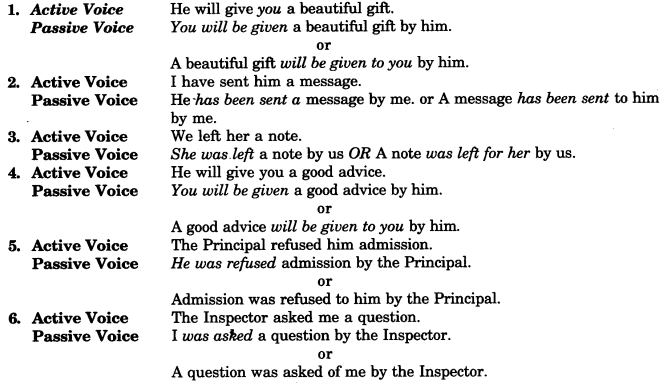
8. SENTENCES WITH OBJECT COMPLEMENTS
In some sentences, a complement is used after an object. As the complement specifies the object, it is called an object complement. Students sometimes take it for the second object and hence commit mistakes while changing into Passive Voice. Place the object complement at the end of the sentence in the passive voice, as we do in the Active Voice. Study the following
Illustrative Examples:
9. SENTENCES WITH LONG OBJECTS
Sometimes the subject of a transitive verb is not a single word but a phrase or a clause. We must keep the phrase as a single unit. Similarly, we may use the clause as the subject of the passive sentence. In case, the clause is too long, we use ‘it is/it was’ as an introductory subject and put the clause after the verb.
Study the following illustrative examples: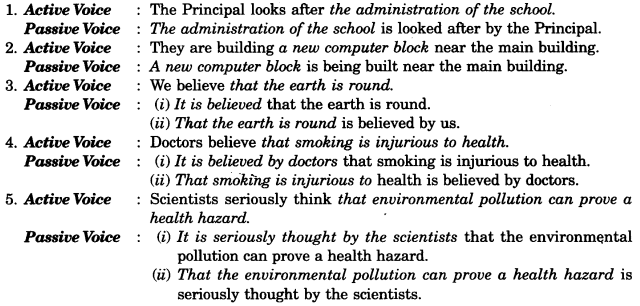
Note. You will notice that the constructions at (i) in sentences 3, 4, and 5 beginning with ‘It is’ look more compact.
10. CHANGE OF INTERROGATIVE SENTENCES
Interrogative sentences remain interrogative in form even in the passive. So, retain the question mark (?) at the end of the sentence. Secondly, put an appropriate helping verb before the subject according to the tense.
Thirdly, Question-words like ‘what’, ‘when’, ‘why’, ‘where’, ‘who’, ‘when’ ‘whose’, ‘which’, ‘How’, etc. come before the helping verb.
So ‘if there is a Wh-word, put it first of all.
There is a catch. Be attentive.
‘Who’ is changed into “by whom’.
‘Whom’ is changed into ‘who’.
Other wh-words remain unchanged.
One more point. What about the changes in auxiliary verbs?
Well, some of them do change their forms according to tenses, eg.,
(а) Do/Does change into is /am/are
(b) Did changes into was/were
In case of (a) Is/am/are (b) was/were and (c) has/have the change is within the group according to the singular/plural number of the subject in the passive voice or according to the person in (d) will/shall and (e) would/should.
Study the following illustrative examples: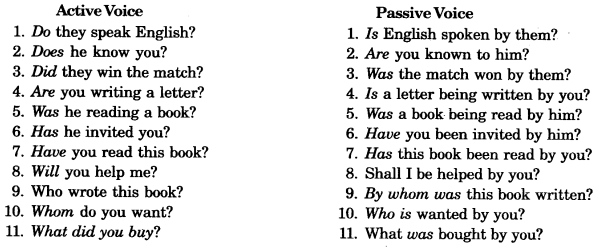

You will note that in sentences 9 to 15, the auxiliary (do/did) in the Active Voices, changes its form to ‘is/was’ but it still retains its position before the subject—because the sentence is still a question.
